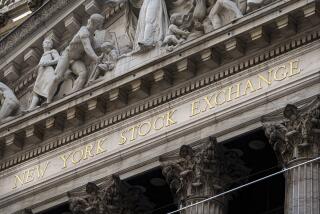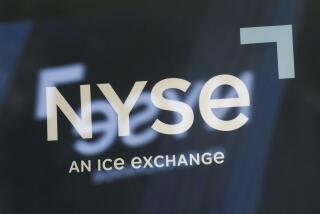Shares of U.S. Brokerages, Banks Fall on Russian Woes
- Share via
Shares of U.S. banks and brokerages were among Thursday’s hardest-hit stocks, plunging on concern that Russia’s debt crisis will slash profits.
J.P. Morgan & Co. dropped 11.1%, its steepest drop since the market crash of Oct. 19, 1987, Merrill Lynch & Co. fell 7.5%, and Citicorp slipped 8.9%. Bloomberg’s Wall Street index of banks, brokerages and money managers fell 7.6%.
Banks slumped after Russia announced a debt-restructuring plan that may threaten corporate profits and spread to other emerging markets. Estimates of what investors who owned Russian debt will get range from 5 cents to 30 cents on the dollar.
“If you’re worried that Asia is a mess and Russia is a mess and that Latin America is the next step, it’s hard to imagine that the U.S. can live in a bubble,” said Marni Pont O’Doherty, a bank analyst at Keefe, Bruyette & Woods Inc.
Brokerage firms were pummeled, as Merrill Lynch fell $6.31 to $78.31, Morgan Stanley Dean Witter & Co. dropped $6.50 to $69.56, and Lehman Bros. Holdings tumbled $7.25 to $50.44.
Financial services companies also fell, with American Express slipping $6.56 to $91.
Banks dropped. Citicorp was down $11.88 to $122, BankAmerica Corp. fell $3.88 to $73.75, and J.P. Morgan was down $13.81 to $104.75, helping drag the Dow Jones industrial average down 357.36 points to 8,165.99.
Republic New York Corp. became one of the first U.S. banks to feel Russia’s sting, saying losses on its investments there would force it to take a charge of $110 million in the third quarter, wiping out its earnings for the period.
The announcement by the nation’s 21st-largest bank was a stark illustration of the exposure of U.S. companies to Russia’s crisis and the impact on profits and bank loans.
Still, U.S. banks have only moderate exposure to the region, unlike their European counterparts, analysts said.
Credit-rating agency Standard & Poor’s Corp. said that it expects only minimal impact on U.S. banks and that it has no plans to change any banks’s credit ratings--including that of Republic New York.
Republic New York’s stock fell to its lowest level since May 1997, closing down $4.63, or 9%, at $45.50 on the New York Stock Exchange.
The bank may be more vulnerable than its bigger rivals because the others did not take such risky bets on Russian debt, said Robert Albertson, U.S. bank research director at Goldman, Sachs & Co.
He called the hammering the bank stocks took in the market an overreaction.
“There can be exceptions, and certainly Republic New York is going to take a pretty severe hit . . . but we do not see that for any of the other banks,” he said. “Why Republic is in that camp I don’t know, but I do know that many of the banks that I have talked to are looking at very modest adjustments.”
While the exact impact of the Russian debt crisis on bank earnings is not yet clear, analysts say Bankers Trust Corp. and J.P. Morgan eventually may suffer the most.
David Berry, a bank analyst at Keefe, Bruyette & Woods Inc., said that if Bankers Trust writes off 100% of its high-risk Russia exposure, its 1999 earnings will fall short of estimates by 30%.
The estimates of Russia’s impact were reflected in the money flows for the stocks. While bank shares fell, investors continued to pour money into Citicorp and BankAmerica while pulling it out of J.P. Morgan, Bankers Trust and, to a lesser extent, Chase Manhattan Corp., according to a Bloomberg analysis.
While the exposure of U.S. banks and brokerages to Russian economic problems is small compared with their European counterparts, investors also are concerned that all banks may take losses on other emerging market debt--including Latin American debt.
“Everything that you could worry about, it seems you have a reason to worry about,” said analyst O’Doherty, including a global market slowdown that could lead to loan losses and lower trading revenue.
More to Read
Inside the business of entertainment
The Wide Shot brings you news, analysis and insights on everything from streaming wars to production — and what it all means for the future.
You may occasionally receive promotional content from the Los Angeles Times.










